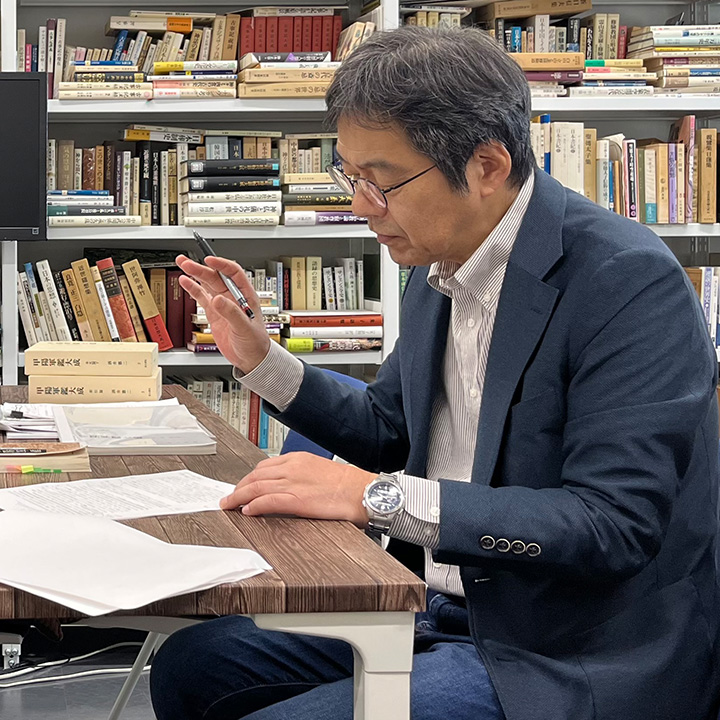Master's Thesis Guidance Seminars are provided in the master's program and Doctoral Dissertation Guidance Seminars are provided in the doctoral program, where students continuously register to take seminars with their faculty advisor from the first year to the year of completion of the course. The advisor carefully instructs students on methodologies for conducting research activities, collecting materials, reading literature, and analyzing data, and students complete their theses / dissertations through presentations and discussions in conjunction with taking the lecture classes.

Japanese Cultural Studies
Overview
The Course of Japanese Cultural Studies aims to achieve the following educational and research objectives.
This Course’s Master's Program is designed to provide students with outstanding expert knowledge and research capabilities in the fields of Japanese language, Japanese literature, Japanese thought, Japanese religion, Japanese arts and culture and Japanese language education, as well as a broad perspective, and to develop highly skilled specialists and educators who can contribute to the maintenance and development of a multicultural society and who will take an active role internationally.
The Doctoral Program aims to develop researchers who can work internationally by acquiring outstanding expert knowledge and research capabilities in the fields of Japanese language, Japanese literature, Japanese thought, Japanese religion, Japanese arts and culture, and Japanese language education, and who are capable of conducting research on Japan and comparative research between Japan and neighboring regions from a global perspective.
Curriculum features
The curriculum includes specializations in such fields as Japanese linguistics, classical literature, modern and contemporary literature, kabuki and ukiyoe, pop culture, contemporary performing arts, Japanese thought and religion, and Japanese language education. The master's program allows students to acquire expert knowledge and research capabilities while also learning about Japanese culture outside of their field of specialization. In the doctoral program, students acquire outstanding research capabilities in a particular field of specialization.
Lecture classes are arranged according to the research fields of Japanese Linguistics, Japanese Literature, Japanese Culture Studies, Japanese Thought, and Japanese Education. By taking these classes, students will learn expert knowledge and the latest research trends in accordance with their own research themes, and they will also learn expert knowledge in related peripheral areas as they advance their own research.
In addition to the lecture classes, there are also seminar classes called Thesis Guidance Seminar. In these seminar classes, students receive consistent guidance from their academic supervisor until the completion of their master's thesis and doctoral dissertation.
Research fields

Japanese Linguistics
The field of Japanese linguistics focuses on the history of Japanese grammar and lexicology. In the field of Japanese grammatical history, based on diachronic knowledge, students analyze data quantitatively and from various perspectives using printed and electronic sources and various corpora, and conduct theoretical research to grasp the actual situation of grammatical phenomena. In lexicology, the focus is on classical literature works and modern Japanese with an emphasis on the principles under which lexical items are created and transformed. By utilizing various corpora, students conduct lexical semantic research focusing on lexical linkage patterns and diachronic study of the lexicon.
Japanese Literature
In addition to Japanese classical literature and modern and contemporary literature, Chinese classical literature is also included in the scope of research. In classical literature, students read mainly waka poems, stories, tales, and diaries up to the Middle Ages, and study the characteristics of these works from an international perspective. In modern and contemporary literature, students analyze individual works based on the process of establishment of modern literature and its characteristics, and research from the viewpoint of how the creation and transmission of works by authors and creators were accepted and had an impact on society. In Chinese classical literature, students mainly analyze Japanese Chinese literature and conduct research on the influence of Chinese classic literature on Japanese literature.
Japanese Culture Studies
Research focuses on deepening understanding of a wide range of Japanese culture, from traditional Japanese to modern and contemporary. In the area of pre-modern Japanese culture, our research includes investigating and reading textual materials from the pre-modern period on noh, kabuki, and ningyo joruri (puppet theater). In addition, also within the scope of research is ukiyoe, given its unique mode of expression and the role it served as a medium. In the field of modern and contemporary culture, research covers representational culture related to language, vision, hearing, etc. The research involves not only the use of materials from the same period, but also approaches from a theoretical aspect.
Japanese Thought
Research is carried out on Japanese thought from ancient times to the modern period. In the field of pre-modern Japanese thought, research focuses on theoretical texts on Shintoism, Buddhism, Medieval Shinto, Bushido, Confucianism, and Kokugaku, as well as on literature on myths, legends, and tales, using hermeneutical methods. In the field of modern Japanese thought, students conduct research on the generation and development of modern and contemporary Japanese thought and philosophy since the Meiji period, which began with the translation and reception of Western thought.
Japanese Education
Considering the relationship between various social issues of our time and Japanese education, the research aims to create a new Japanese language education for the coming era that connects society and Japanese language education. Students extract themes from various issues in Japanese education, consider ways to solve such issues from a practical standpoint, and construct new theories of instruction that meet their own research themes while enhancing their expertise in subject and teaching capabilities.









